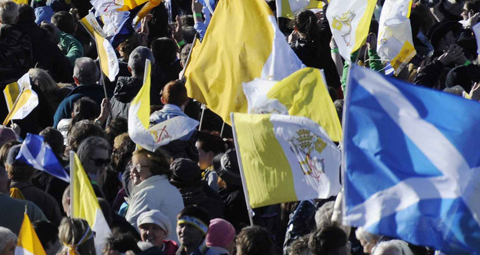May 3 | ![]() 0 COMMENTS
0 COMMENTS ![]() print
print

Speculation, sectarianism and the Church in Scotland
This week's editorial
Speculation in the secular media this week about the timing of much-needed, and long awaited, Vatican appointments to the Scottish hierarchy falls into the ‘smoke’ and ‘fire’ category—if enough hot air is blown as smoke then there must be a fire somewhere, correct? Not quite.
The facts are these: Two Scottish dioceses (Dunkeld and Paisley) were without bishops prior to Cardinal Keith O’Brien’s resignation as Archbishop of St Andrews and Edinburgh in February, and another two bishops reached the retirement age of 75 in the last 12 months. In the second half of the 20th century Scotland had one of the youngest Episcopal hierarchies in Europe, and, until the most recent appointments, we had one of the oldest and most experienced.
Five of Scotland’s eight dioceses are now without permanent Vatican-appointed leaders and we pray Pope Francis will make Scotland—‘special daughter of the see of Rome’ (Clement III, 1188)—an urgent priority. However, getting the appointments ‘right’ must be the overriding factor.
It is incumbent on the Scottish Government to provide a comprehensive agenda to tackle sectarianism, with education at its heart, but our elected officials clearly still require to be fully informed themselves on religious bigotry.
If the Offensive Behaviour at Football and Threatening Communications (Scotland) Act 2012 (currently being reviewed and largely seen as a failure) is anything to go by, this government thinks that sectarianism originates in the football ground when in fact many of our clubs’ stadiums have, unfortunately, become the last gladiatorial arenas for religious bigotry to be played out.
The government must immediately redirect better resources to the classroom to tackle the underlying societal problems that lead to sectarianism and ensure that the future of Catholic schools, one of the remedies to the problem, is preserved in Scotland’s future, be that future as an independent country or as part of the UK. This recommendation contradicts the recommendations of one anti-sectarian body funded by the Scottish Government. As recently as last year, a spokesman for Nil By Mouth advised the government to intentionally increase the number of shared campuses as a solution to sectarianism, a sweeping recommendation that the Scottish Church would not support.
What has become increasingly clear is that the anti-Catholic religious bigotry in modern Scotland requires a multi-level, and multi-agency, approach if we are ever to treat the cause instead of just the symptoms, as seen in football stadiums.
—The second part of this week’s editorial leader includes part of a debate on Twitter this week











